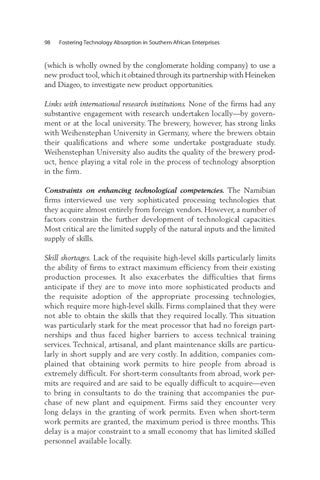98
Fostering Technology Absorption in Southern African Enterprises
(which is wholly owned by the conglomerate holding company) to use a new product tool, which it obtained through its partnership with Heineken and Diageo, to investigate new product opportunities. Links with international research institutions. None of the firms had any substantive engagement with research undertaken locally—by government or at the local university. The brewery, however, has strong links with Weihenstephan University in Germany, where the brewers obtain their qualifications and where some undertake postgraduate study. Weihenstephan University also audits the quality of the brewery product, hence playing a vital role in the process of technology absorption in the firm. Constraints on enhancing technological competencies. The Namibian firms interviewed use very sophisticated processing technologies that they acquire almost entirely from foreign vendors. However, a number of factors constrain the further development of technological capacities. Most critical are the limited supply of the natural inputs and the limited supply of skills. Skill shortages. Lack of the requisite high-level skills particularly limits the ability of firms to extract maximum efficiency from their existing production processes. It also exacerbates the difficulties that firms anticipate if they are to move into more sophisticated products and the requisite adoption of the appropriate processing technologies, which require more high-level skills. Firms complained that they were not able to obtain the skills that they required locally. This situation was particularly stark for the meat processor that had no foreign partnerships and thus faced higher barriers to access technical training services. Technical, artisanal, and plant maintenance skills are particularly in short supply and are very costly. In addition, companies complained that obtaining work permits to hire people from abroad is extremely difficult. For short-term consultants from abroad, work permits are required and are said to be equally difficult to acquire—even to bring in consultants to do the training that accompanies the purchase of new plant and equipment. Firms said they encounter very long delays in the granting of work permits. Even when short-term work permits are granted, the maximum period is three months. This delay is a major constraint to a small economy that has limited skilled personnel available locally.
